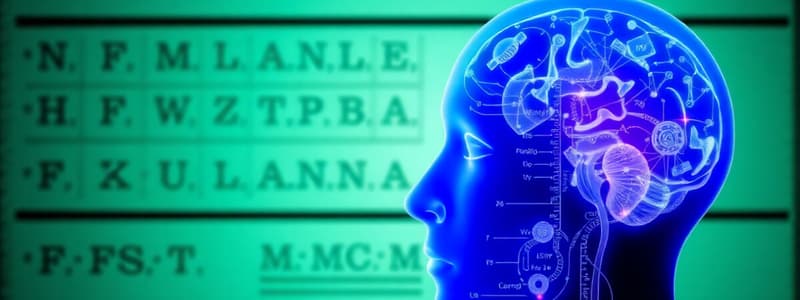Podcast
Questions and Answers
What does reliability primarily refer to in measurement?
What does reliability primarily refer to in measurement?
- The accuracy of the measurements taken
- The degree of detail in the measurement
- The relevance of the measurement to the construct
- The consistency of the measurements (correct)
Which type of reliability assesses consistency across time?
Which type of reliability assesses consistency across time?
- Inter-rater reliability
- Internal consistency
- Split-half reliability
- Test-retest reliability (correct)
What statistical method is used to assess internal consistency?
What statistical method is used to assess internal consistency?
- Cohen’s κ
- Pearson’s r
- Cronbach’s α (correct)
- Spearman’s rho
What does a Pearson’s r value of +.95 indicate regarding test-retest reliability?
What does a Pearson’s r value of +.95 indicate regarding test-retest reliability?
Which type of validity considers whether a measurement appears to measure what it is supposed to measure?
Which type of validity considers whether a measurement appears to measure what it is supposed to measure?
Which type of validity involves measuring a criterion simultaneously with the construct?
Which type of validity involves measuring a criterion simultaneously with the construct?
What concept refers to the extent to which observers provide consistent judgments?
What concept refers to the extent to which observers provide consistent judgments?
Which of the following describes validity as it pertains to measurement?
Which of the following describes validity as it pertains to measurement?
What does the discipline of Psychometrics study?
What does the discipline of Psychometrics study?
Which of the following is NOT a characteristic of psychological tests?
Which of the following is NOT a characteristic of psychological tests?
Which of the following best defines a psychological construct?
Which of the following best defines a psychological construct?
What is a proposed process in developing a psychological construct definition?
What is a proposed process in developing a psychological construct definition?
Which of the following is an example of an operational definition?
Which of the following is an example of an operational definition?
Categories for measuring variables specifically include which of the following?
Categories for measuring variables specifically include which of the following?
What term describes the extent different methods produce similar results?
What term describes the extent different methods produce similar results?
Which psychological construct might be related to behaviors surrounding technology use?
Which psychological construct might be related to behaviors surrounding technology use?
Study Notes
Psychological Measurement
- Definition: The assignment of scores to represent a characteristic of an individual.
- Psychometrics: Discipline concerned with the measurement of psychological phenomena.
- Examples: Working memory, digit span.
Features of Psychological Tests
- Sample behavior: They collect a systematic sample of behavior.
- Standardized conditions: Behavior is sampled under standardized conditions.
- Established scoring rules: Quantitative (numeric) information is obtained from the behavior sample using specific rules.
Psychological Constructs
- Definition: Represent tendencies in how people think, feel, and behave across various situations.
- Abstract summaries: Represent complex sets of behavior and internal processes.
- Indirect observation: Often involve internal, unobservable processes.
- Examples: Neuroticism, fear, anxiety, anger, sadness.
Operational Definitions
- Specifications: How a construct or variable is measured.
- Categories:
- Self-report: Asking individuals about their thoughts, feelings, and behaviors.
- Behavioral: Observing and recording actions.
- Physiological: Measuring bodily responses, such as heart rate or brain activity.
- Converging Operations: Different operational definitions producing similar results for a construct.
Levels of Measurement
- Nominal: Categories with no order (e.g., gender, hair color).
- Ordinal: Categories with order, but no equal intervals (e.g., rank in a competition, level of agreement).
- Interval: Equal intervals between categories, but no true zero (e.g., temperature in Celsius).
- Ratio: Equal intervals with a true zero (e.g., height, weight, reaction time).
Reliability and Validity of Measurement
- Reliability: Consistency of a measurement.
- Types of reliability:
- Test-retest: Consistency over time. Assessed using Pearson's r (correlation coefficient) with minimum acceptable range of 0.6 to 0.8
- Internal consistency: Consistency across multiple items. Assessed using Cronbach's α.
- Inter-rater: Consistency between different observers. Assessed using Cronbach's α or Cohen's κ.
Validity
- Definition: Extent to which scores represent the intended construct.
- Types of Validity:
- Face: Appearance of measuring the intended construct.
- Content: comprehensiveness of the measurement.
- Criterion: Correlation with other measures of the construct.
- Concurrent validity: Measures taken concurrently.
- Predictive validity: Future outcomes prediction.
- Convergent validity: Agreement between multiple measures of the same construct.
- Discriminant validity: Distinguishing the intended construct from other constructs.
Examples
- Fear: A psychological construct with measurable aspects: physiological (elevated heart rate), behavioral (avoidance), cognitive (worried thoughts).
- Stress: Can be measured in different ways: self-report scale (perceived stress scale), physiological measures (cortisol levels), behavioral observations (frequency of negative coping mechanisms).
Studying That Suits You
Use AI to generate personalized quizzes and flashcards to suit your learning preferences.
Related Documents
Description
Explore the fascinating world of psychological measurement in this quiz. Learn about psychometrics, features of psychological tests, and the complexities of psychological constructs. Test your understanding of how behavior is quantified and evaluated under standardized conditions.




